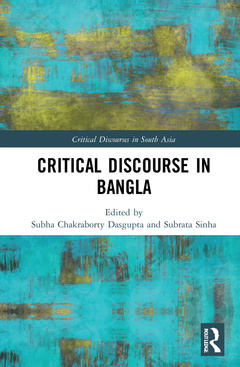Critical Discourse in Bangla Critical Discourses in South Asia Series
Coordonnateurs : Dasgupta Subha Chakraborty, Sinha Subrata

This volume forms a part of the Critical Discourses in South Asia series which deals with schools, movements, and discursive practices in major South Asian languages. It offers crucial insights into the making of Bengali or Bangla literature and its critical tradition across a century. The book brings together English translation of major writings of influential figures dealing with literary criticism and theory, aesthetic and performative traditions, and reinterpretations of primary concepts and categories in Bangla. It presents 32 key texts in literary and cultural studies from Bengal from the middle of the 19th to that of the 20th century, with most of them translated for the first time into English. These seminal essays are linked with socio-historical events and phenomena in the colonial and post-independence period in Bengal, including the background to the Language Movement in Bangladesh. They discuss themes such as integrative aesthetic visions, poetic and literary forms, modernism, imagination, power structures and social struggles, ideological values, cultural renovations, and humanism.
Comprehensive and authoritative, this volume offers an overview of the history of critical thought in Bangla literature in South Asia. It will be essential for scholars and researchers of Bengali/Bangla language and literature, literary criticism, literary theory, comparative literature, Indian literature, cultural studies, art and aesthetics, performance studies, history, sociology, regional studies, and South Asian studies. It will also interest the Bengali-speaking diaspora and those working on the intellectual history of Bengal and conservation of languages and culture
Introduction 1. Bengal and the Bengali in Charyageeti 2. The Emergence of the Baul Sect and the Period of Composition of Baul Songs 3. The Termination of Sri Gauranga’s Leela 4. The Gaudiya Vaishnav Order: Its Treatises on Rhetoric and Rasa 5. The Early Poets 6. A Message to the New Writers of Bengal. Sakuntala, Miranda and Desdemona 7. Preface to Sabuj Patra 8. The Bengali Youth and Three Poets 9. The Sign of the Epic 10. Tragedy in Bangla Literature 11. A Consideration of Literature 12. Rasa and The Question of Taste 13. The Poetic Mind 14. Three Essays from Literature 15. The Search for World Language and World Literature in Poetry 16. Rabindranath and his Successors 17. The Liberation of Poetry 18. On Poetry 19. Progressiveness in Bangla Literature 20. Bangla Literature and Muslims 21. Why I Write 22. My Thoughts on Literature 23. I/ My Writing 24. In Search of a New Form of the Novel 25. Form in Theatre 26. Theatre Moments and the Search for Language 27. The Language of Theatre 28. The Alkap Theatre Tradition and Third Theatre 29. State Language and Language Issues in Bangladesh
Subha Chakraborty Dasgupta is former Professor of Comparative Literature, Jadavpur University, Kolkata, India. She was Visiting Professor, University of Delhi, India, and Tokyo University of Foreign Studies, Japan. Her research interests and publications span the fields of cultural studies, gender perspectives, oratures, and translation. She has a book entitled Bibliography of Reception: World Literature in Bengali Periodicals (1890-1900) to her credit, and her most recent volume co-edited with K. Alfons Knauth is Figures of Transcontinental Multilingualism (2018).
Subrata Sinha is Assistant Professor of Bangla at St. Xavier’s College, Kolkata (Raghabpur Campus), India. Earlier, he worked for the School of Cultural Texts and Records, Jadavpur University, and the Archives and Research Centre for Ethnomusicology, Gurgaon, India. His monograph Adhunikatar Kavyatattva o Sudhindranath Datta was published in 2019.
Date de parution : 09-2023
15.6x23.4 cm
Date de parution : 11-2021
15.6x23.4 cm
Thème de Critical Discourse in Bangla :
Mots-clés :
Young Men; Sabuj Patra; Bangla literature and criticism; Bankimchandra Chattopadhyay; aesthetics; Mahasweta Devi; rasa; Ashapurna Devi; Charyapad; Abdul Kadir; Baul; Bangla Literary; Sri Gauranga’s leela; Manik Bandyopadhyay; modernisms; Saratchandra Chattopadhyay; on poetry; Amiya Chakravarty; Rabindranath Tagore; Pramatha Chaudhuri; IPTA; Bangla Language; progressiveness; Sanskrit Poetics; Alkap; Sri Chaitanya; Third Theatre; Santal Parganas; Debes Ray; Language issues in Bangladesh; Bengali Muslim; World literature; Gaudiya Vaisnavism; new form of the novel; Anti-Fascist Writers; imagination; 10th Century CE; wonder; Sanskrit Aestheticians; Gaudiya Vaishnav; Contemporary Society; Water Falls



